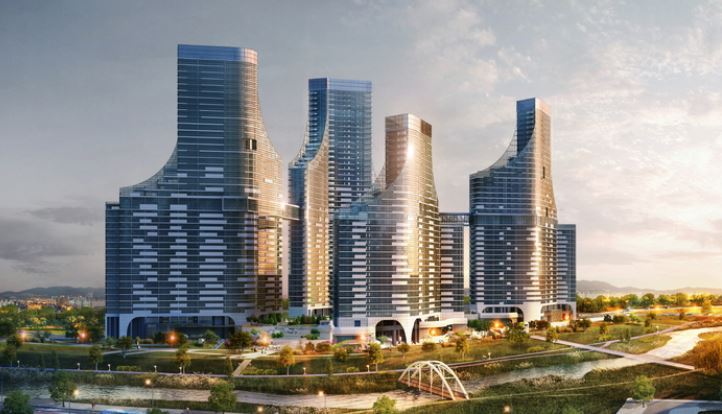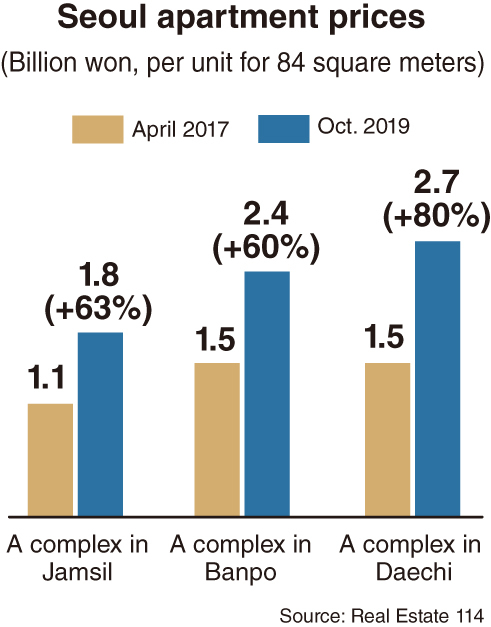[News Focus] People question policy on Seoul apartments
By Kim Yon-sePublished : Nov. 17, 2019 - 17:37
SEJONG -- An online commenter, who identified himself as a salaried worker in charge of a household, wrote earlier this month that he bought an apartment in Seoul during the latter part of the Park Geun-hye administration (2013-2017).
The price of the apartment has climbed 300 million won ($257,000) during President Moon Jae-in’s term, which began in May 2017, according to the commenter’s post.
“But I don’t feel so happy when I think about (negative) effects of this kind of windfall profits on future generations, including my children,” he wrote on an Internet portal.
His comments reflect the situation that the average apartment price in southern Seoul and some other districts out of the 25 wards in the capital surpasses the cumulative income of an ordinary salaried worker for about three decades until retirement.
The price of the apartment has climbed 300 million won ($257,000) during President Moon Jae-in’s term, which began in May 2017, according to the commenter’s post.
“But I don’t feel so happy when I think about (negative) effects of this kind of windfall profits on future generations, including my children,” he wrote on an Internet portal.
His comments reflect the situation that the average apartment price in southern Seoul and some other districts out of the 25 wards in the capital surpasses the cumulative income of an ordinary salaried worker for about three decades until retirement.

In the Gangnam and Seocho wards in southern Seoul, apartment prices per unit for 84 square meters range between about 1.8 billion won and 3 billion won generally. Premium, wider apartments could go beyond such levels in these wards.
According to Real Estate 114, an 84-square-meter apartment unit in Banpo-dong, Seocho-gu, traded at 2.42 billion won in October 2019, up nearly 900 million won in just 30 months, compared to sales of other same-sized units at the complex for 1.55 billion won in April 2017.
Theoretically, a salaried worker whose annual income is 50 million won on average for 30 years can save 1.5 billion won, assuming the employee saves his or her entire wages without spending money before quitting.
Apart from Gangnam and Seocho, there are several other Seoul wards with apartment unit prices that hover at 1.5 billion won or above.
The Moon administration has implemented a series of real estate policies targeting Seoul in particular, under the slogan of cracking down on speculative capital and curbing prices.
But a large portion of online commenters have cast doubt over the efficacy and soundness of such policies.
Furthermore, some have alleged that both the administration and those with vested interests are not willing to lower prices in southern Seoul and other areas.

Some polices over the past two years have even paved the way for owners of multiple homes to secure their wealth -- such as by providing them with tax benefits if they are registered as operators of home rental businesses.
Kim Sung-dal, director general of the Citizens Coalition for Economic Justice, was quoted by a broadcaster as saying that “Land Minister Kim Hyun-mee, when she took office, expressed her commitment to anti-speculation efforts (by introducing a concept that housing should) not be (a method for making) money but residential places for ordinary people.”
But housing prices have ultimately reached an all-time high, as anti-speculation has not been reflected in polices, he said.
SDInomics chief Sun Dae-in said the incumbent administration has failed to put the brakes on the heated property market, which began during the previous administration. He added that the Moon administration has carried out real estate policies “in dribs and drabs,” prolonging the heated market.
Meanwhile, some market insiders and online commenters have pointed out that apartment prices should be determined by market principles -- not by regulations hampering demand and supply among traders.
A Myongji University professor was quoted by a news provider as saying, “11 of 19 real estate polices during Moon’s term were regulation-focused polices. Any regulation, of no doubt, cannot but fan a spike in prices (on a repulsive power).”
In addition, online commenters say the government has glossed over the consistent demand from ordinary citizens to drastically raise property-holding taxation rates, which would increase the burden for those owning high-priced apartments and multiple-home owners. This is regarded as one of the most powerful measures against speculation.
They call for the government to guarantee the free trade of apartments after introducing the higher property-holding tax and scrapping existing regulations with little efficacy.
But the latest regulation unveiled by the Land Ministry places a price cap on new apartment offerings built by private constructors, staring from April 29, 2020.
However, the apartment price ceiling has raised concerns about a supply shortage, with builders expected to construct apartments in a conservative manner to prevent their operating profits from falling.
In another possible side effect from the price cap, for example, builders could be forced to sell a unit at about 40 million won or under per 3.3 square meters, despite prices of 50 to 60 million won at already-built neighboring apartment complexes.
As the prices of new apartments are expected to shortly recover to the levels of neighboring apartments, the policy has been described as “a lottery” among critics in terms of gaining huge capital.
Nonetheless, ordinary citizens would not be able to enjoy the “lottery” even if they passed the state-led apartment subscription competition.
As property regulations include strict mortgage rules and a sales ban for several years after winning a draw, the wealthy bracket with sufficient cash would ultimately take over the units when ordinary people fail to meet the intermediate or final payment due before moving into the new apartments.
By Kim Yon-se (kys@heraldcorp.com)


![[Exclusive] Korean military set to ban iPhones over 'security' concerns](http://res.heraldm.com/phpwas/restmb_idxmake.php?idx=644&simg=/content/image/2024/04/23/20240423050599_0.jpg&u=20240423183955)

![[Graphic News] 77% of young Koreans still financially dependent](http://res.heraldm.com/phpwas/restmb_idxmake.php?idx=644&simg=/content/image/2024/04/22/20240422050762_0.gif&u=)



![[Pressure points] Leggings in public: Fashion statement or social faux pas?](http://res.heraldm.com/phpwas/restmb_idxmake.php?idx=644&simg=/content/image/2024/04/23/20240423050669_0.jpg&u=)









